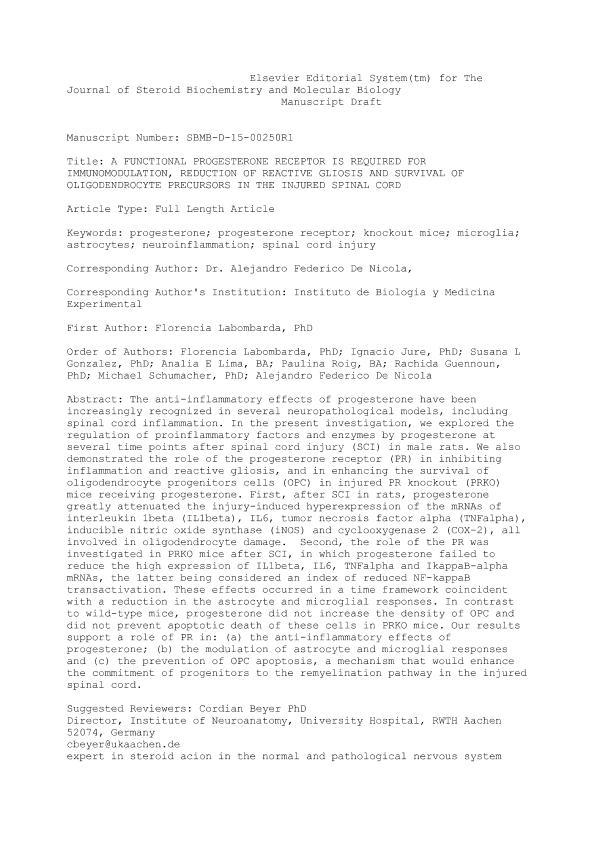Artículo
A functional progesterone receptor is required for immunomodulation, reduction of reactive gliosis and survival of oligodendrocyte precursors in the injured spinal cord
Labombarda, Maria Florencia ; Jure, Ignacio
; Jure, Ignacio ; Gonzalez, Susana Laura
; Gonzalez, Susana Laura ; Lima, Analia Ethel
; Lima, Analia Ethel ; Roig, Paulina
; Roig, Paulina ; Guennoun, Rachida; Schumacher, Michael; de Nicola, Alejandro Federico
; Guennoun, Rachida; Schumacher, Michael; de Nicola, Alejandro Federico
 ; Jure, Ignacio
; Jure, Ignacio ; Gonzalez, Susana Laura
; Gonzalez, Susana Laura ; Lima, Analia Ethel
; Lima, Analia Ethel ; Roig, Paulina
; Roig, Paulina ; Guennoun, Rachida; Schumacher, Michael; de Nicola, Alejandro Federico
; Guennoun, Rachida; Schumacher, Michael; de Nicola, Alejandro Federico
Fecha de publicación:
11/2015
Editorial:
Pergamon-Elsevier Science Ltd
Revista:
Journal of Steroid Biochemistry and Molecular Biology
ISSN:
0960-0760
e-ISSN:
1879-1220
Idioma:
Inglés
Tipo de recurso:
Artículo publicado
Clasificación temática:
Resumen
The anti-inflammatory effects of progesterone have been increasingly recognized in several neuropathological models, including spinal cord inflammation. In the present investigation, we explored the regulation of proinflammatory factors and enzymes by progesterone at several time points after spinal cord injury (SCI) in male rats. We also demonstrated the role of the progesterone receptor (PR) in inhibiting inflammation and reactive gliosis, and in enhancing the survival of oligodendrocyte progenitors cells (OPC) in injured PR knockout (PRKO) mice receiving progesterone. First, after SCI in rats, progesterone greatly attenuated the injury-induced hyperexpression of the mRNAs of interleukin 1β (IL1β), IL6, tumor necrosis factor alpha (TNFα), inducible nitric oxide synthase (iNOS) and cyclooxygenase 2 (COX-2), all involved in oligodendrocyte damage. Second, the role of the PR was investigated in PRKO mice after SCI, in which progesterone failed to reduce the high expression of IL1β, IL6, TNFα and IκB-α mRNAs, the latter being considered an index of reduced NF-κB transactivation. These effects occurred in a time framework coincident with a reduction in the astrocyte and microglial responses. In contrast to wild-type mice, progesterone did not increase the density of OPC and did not prevent apoptotic death of these cells in PRKO mice. Our results support a role of PR in: (a) the anti-inflammatory effects of progesterone; (b) the modulation of astrocyte and microglial responses and (c) the prevention of OPC apoptosis, a mechanism that would enhance the commitment of progenitors to the remyelination pathway in the injured spinal cord.
Archivos asociados
Licencia
Identificadores
Colecciones
Articulos(IBYME)
Articulos de INST.DE BIOLOGIA Y MEDICINA EXPERIMENTAL (I)
Articulos de INST.DE BIOLOGIA Y MEDICINA EXPERIMENTAL (I)
Articulos(OCA HOUSSAY)
Articulos de OFICINA DE COORDINACION ADMINISTRATIVA HOUSSAY
Articulos de OFICINA DE COORDINACION ADMINISTRATIVA HOUSSAY
Citación
Labombarda, Maria Florencia; Jure, Ignacio; Gonzalez, Susana Laura; Lima, Analia Ethel; Roig, Paulina; et al.; A functional progesterone receptor is required for immunomodulation, reduction of reactive gliosis and survival of oligodendrocyte precursors in the injured spinal cord; Pergamon-Elsevier Science Ltd; Journal of Steroid Biochemistry and Molecular Biology; 154; 11-2015; 274-284
Compartir
Altmétricas



